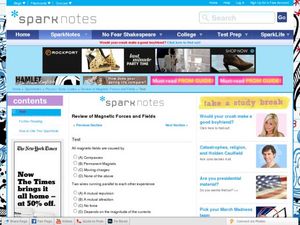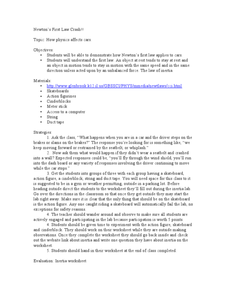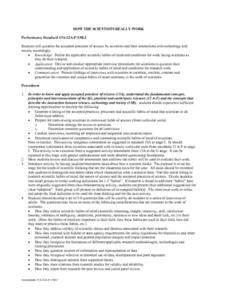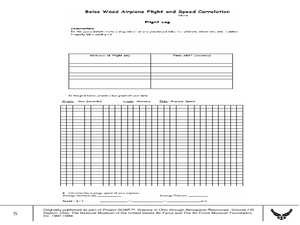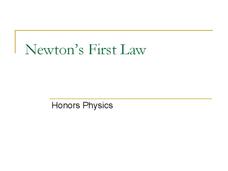Curated OER
Review of Vectors
In this physics activity, students complete 50 multiple choice questions on vector addition. They calculate displacement and resultant vectors.
Curated OER
Review of Magnetic Forces and Fields
In this physics worksheet, students answer 50 multiple choice questions on properties of and behavior of magnetic fields and forces.
Curated OER
Newton's First Law Crash!!
Students examine Newton's first law of motion and demonstrate how it applies to cars. In this motion lesson students complete an experiment and worksheet on speed and inertia.
Curated OER
How The Scientists Really Work
High schoolers question the accepted practices of science by scientists and their interactions with technology and society. They devise and conduct appropriate interview procedures for scientists to question their understanding and...
Curated OER
Introduction to Adult Insects and Their Adaptations
Students study organisms found in Class Insecta. They examine the different adaptations these organisms have developed over time to survive and prosper in their respective habitats. They research the origin of the names of several orders...
Curated OER
Seed Germination
Students germinate a Mung Bean seed. In this seed activity students conduct an experiment germinating a Mung Bean. They apply three different treatments to the seeds: dry, moist, and underwater incubation.
Curated OER
Acceleration 2
In this acceleration worksheet, students experiment with varying amounts of mass to observe the effects on the force needed to move an object. Students apply Newton's Second Law of Motion to describe the relationship between mass and...
Curated OER
Balsa Wood Airplane Flight and Speed Correlation
Ninth graders calculate the average speed of their balsa wood airplane. For this physics lesson, 9th graders build their own airplane and make necessary modifications to to make it fly straight. They interpret distance and time graph...
Curated OER
Gravity (Newton's Laws of Motion): A Weighty Subject
Students identify Newton's Laws of Motion. They students explore Newton's Laws of Motion and apply the second law with a classroom activity. The videos will provide visual examples of the effects of gravity while riding on a roller coaster.
Curated OER
The Ultimate Roller Coaster Contest
Young scholars explain how conservation of energy applies to roller coasters. In this physics lesson, students construct their own coasters according to a specified criteria. They make modifications to their design when necessary.
Curated OER
Newton's First Law Crash!
Learners define what inertia is in their own words. In this physics lesson, students observe what happens to their action figure as the skateboard stops suddenly. They apply Newton's 1st law to real world situations.
Curated OER
Vectors: How Much Force Can You Apply
This lesson entails the viewing of two videos to get an overview of force and its application. The lesson covers how vectors use force in real-world situations.
Curated OER
Albedo and Irradiation of Surfaces
Here is a physical science activity where pupils place thermometers inside of a white and a black paper pocket and place them under a lamp. They record and compare the temperature increase over a ten-minute period. Have your class...
Curated OER
Boyle's Law
After viewing this PowerPoint, physical science learners will be able to apply Boyle's law. Background information, reasoning, and data will help in understanding the behavior of gases. There are a few slides that require pupils to...
It's About Time
Center of Mass
Lead your class on an exploration as they locate the center of mass in several oddly shaped two-dimensional objects they create from their imaginations. Pupils also determine the location of the center of mass in three-dimensional...
Kenan Fellows
What Element Would You Be?
Primo Levi wrote a collection of short stories comparing his life from Italy to Auschwitz to elements in the periodic table. Pupils read an excerpt from his book and research the characteristics of various elements. Then, they make a...
Bowels Physics
Newton's First Law
Force acts on objects in mysterious ways ... until now! A comprehensive presentation explains the balance of forces acting on objects. Learners draw free body diagrams to show these invisible forces and make force calculations.
Lerner Publishing
Living or Nonliving
It's alive! Or is it? Through a series of shared readings, whole class activities, and independent exercises children explore the difference between living and non-living things, creating a pair of printable books to demonstrate their...
Education Outside
Papermaking
Imagine recycling food scraps and using them to make paper. The directions are all here in a seven-page packet that details several paper-making strategies.
Jefferson Lab
Optics: Mirrors and Lenses
Did you see that or did I imagine it? Optical illusions are often created with mirrors and lenses, and here is a presentation that covers many different types of mirrors and lenses and how they work. Flat, concave, and convex mirrors, as...
Laboratory for Atmospheric and Space Physics
Charting the Progress of New Horizons
In 2006, New Horizons began its mission to fly to Pluto. As it continues its journey, scholars track its progress with the help of an informative website, all the while reinforcing measurement concepts with the construction of a scaled...
University of Colorado
Are All Asteroids' Surfaces the Same Age?
Did you know scientists can tell the age of an asteroid by looking closely at its craters? This final instructional activity of a six-part series focuses on two asteroids, Gaspra and Ida, in order to demonstrate the concept of dating...
Mathematics Vision Project
Quadratic Functions
Inquiry-based learning and investigations form the basis of a deep understanding of quadratic functions in a very thorough unit plan. Learners develop recursive and closed methods for representing real-life situations, then apply these...
Curated OER
States of Matter
Properties in measurement, pressure and viscosity of solids, liquids, and gases are the main topics covered in this slideshow. The explanations of Pascal's, Bernoulli's, and the Venturi effects are very clear. Easy to understand diagrams...



